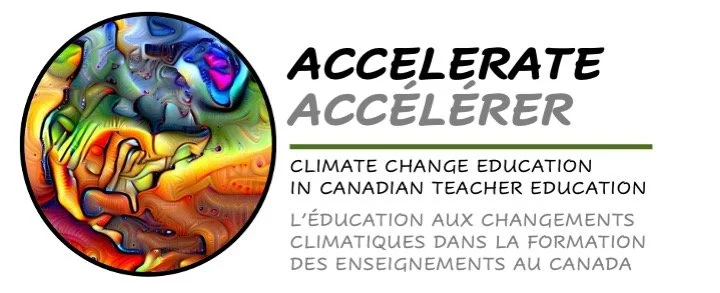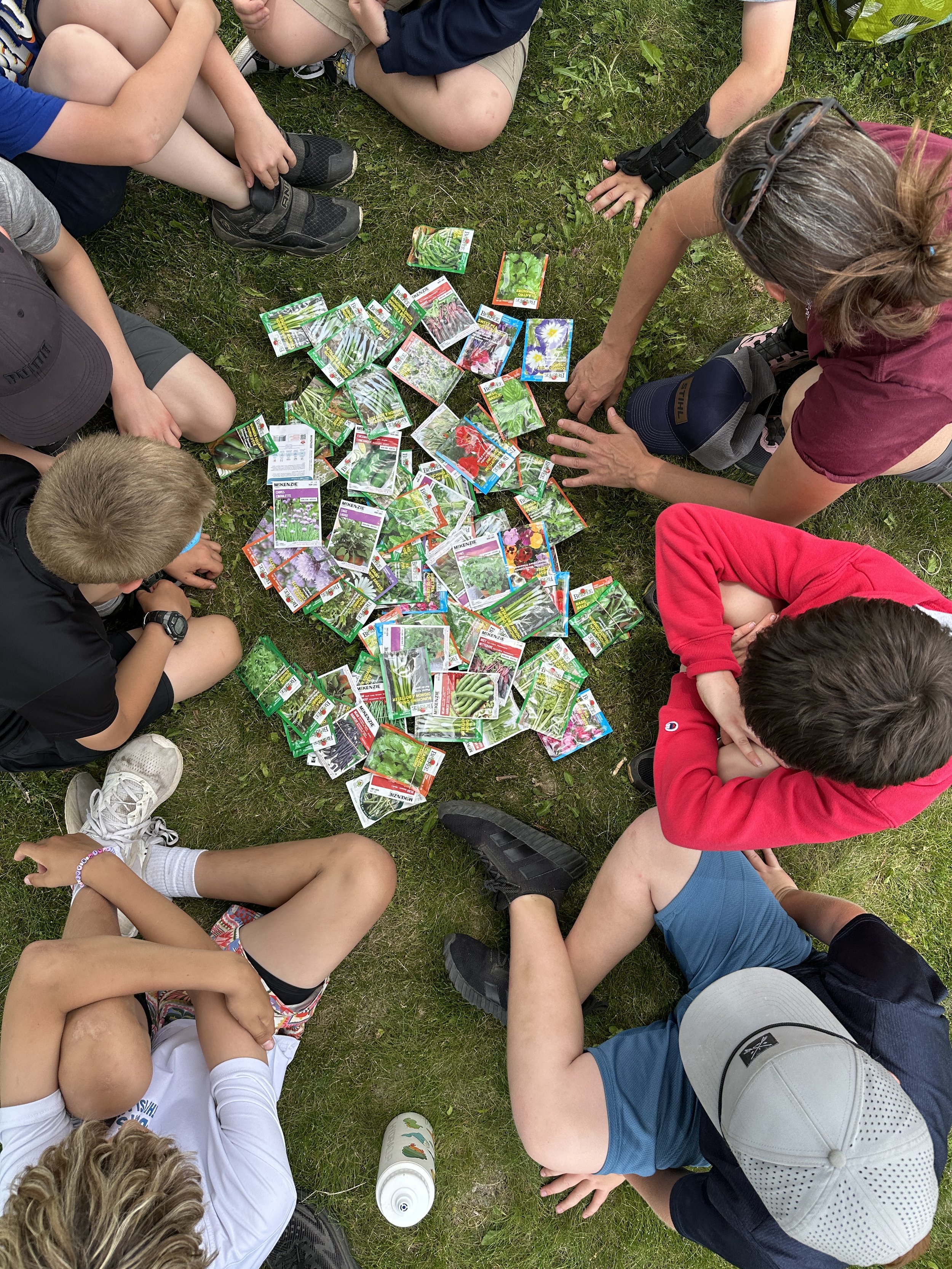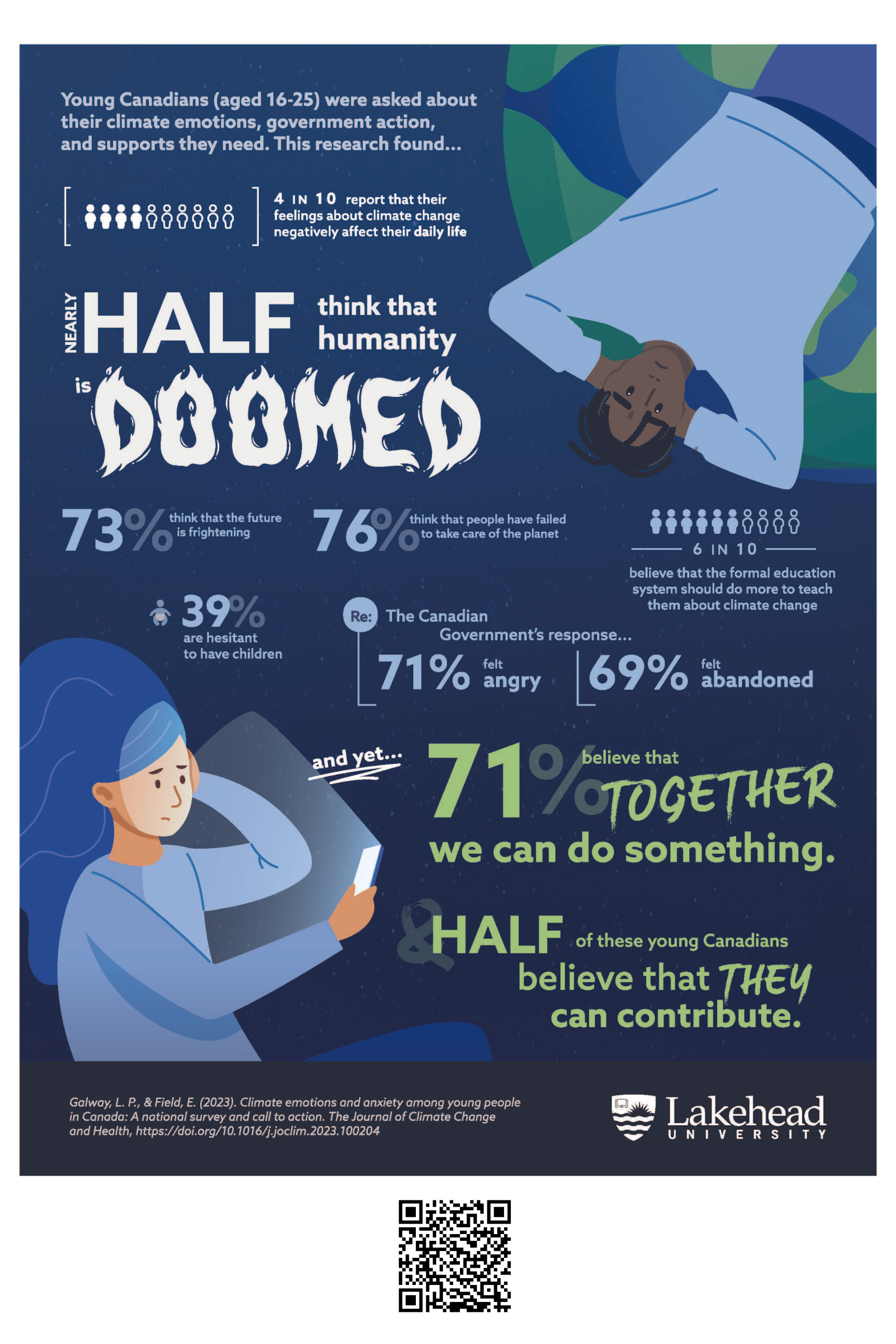
Research
My focus is on reorienting learning within formal education to ensure that educational institutions are responsive to authentically addressing the socio-ecological challenges facing communities. With the existential threat of irreversible climate impacts, we have a narrowing window of opportunity, and are required to drastically reduce greenhouse gas emissions to hold global warming to 1.5 degrees by 2030 (IPCC, 2018). The urgency and change required to safeguard climate stability is being compared to world war efforts (Stigiliz, 2019; Gilding, 2012).
Educational institutions have been slow to respond in preparing young people for climate-altered futures or in providing opportunities to learn about and directly engage in taking action in their local communities. The global child- and youth-led climate strike movement is a clear signal of how formal educational institutions have failed to directly address the concerns young people have over their future quality of life.
My research focuses on how the school structure can foster learning that builds relationships across organizations and generations in communities and develop pathways to inclusive and hopeful futures. Children and young people are central agents in my research as they are too often excluded from policy, governance, or curriculum decisions that affect their educational experiences and inherited futures. My research also investigates teachers’ practices since their decisions and actions greatly influence child and youth experiences in school.
PROJECTS
This project aims to support and accelerate Climate Change Education (CCE) in Teacher Education across Canada. Educators at all levels, from Kindergarten to higher education, are well-positioned to lead the cultural shifts needed for equitable, just and sustainable forms of living on the Earth. The ACDE’s Accord on Education for a Sustainable Future (2022) specifies that Canadian teacher education programs have a responsibility to support educators’ professional learning in CCE, for both those studying to be teachers in pre-service teacher ed programs, and for those already in the teaching profession (in-service learning).
With the help of Environment and Climate Change Canada, this two-year project provides support to develop and deepen Climate Change Education in teacher education across Canada. Each of the five program components develop and/or enhance professional learning opportunities for preservice teachers (those training to be teachers), faculty members in faculties of education, as well as in-service (K-12) teachers (those already certified to teach). Through organizing consultations, webinars, online courses, as well as making grants and resources available, this project aspires to have multiple components of CCE and Environmental & Sustainability Education available in all Canadian faculties of education for all educators to get involved in addressing the climate crisis. Check out the ACCE-TE viewbook (below) to learn more about how our work has impacted Climate Change Education in Canadian teacher education
Lakehead’s Farm Lab is a ‘micro’ model agroecological farm and school garden support program for hands-on, experiential, place-based education. With a focus on science and other curriculum subjects, we help to grow a more healthy, sustainable, and just food system for our community. Working with Dr. Chris Murray, Jacob Kearey-Mooreland, Lindsay Sargent, Linda Grant, and Mellissa Spencer, this team of educators is planting seeds of community resilience, one kid and seed at a time.
Climate Leadership within Canadian School Boards:
2023 Review
This white paper provides a snapshot of climate leadership and the lack of climate action within Canadian school boards, benchmarking criteria such as climate action plans, climate emergency declarations, and strategic plan mentions of climate change or GHG emissions.
Data Collection
A web-scraping protocol was developed to collect information from 354 Canadian school board websites. The protocol used custom search engine searches with keywords "climate action" and "climate change" to extract relevant data. The data collection took place between April 26th and May 4th, 2022, resulting in 1834 files from school board websites. A manual check of all 380 school board, authority and division websites across Canada was conducted between June 5, 2023, and July 27, 2023. Search terms "climate action" and "climate change" were used to find new files and update the inventory.
Key Findings
Only four school boards in Canada had published Climate Action Plans: Toronto District School Board, Trillium Lakelands District School Board, Richmond School District and Greater Victoria School District
Five school boards have Environmental or Sustainability Plans that mention climate change or greenhouse gas reductions.
Nine school boards, primarily in British Columbia, included climate change or greenhouse gas reductions in their strategic plans.
Mandatory reporting on energy and greenhouse gas emissions was required in Ontario and British Columbia but not in other provinces or territories. On average, Ontario school boards are aiming for less than 2% annual GHG reductions.
Only ten school boards in Canada have declared a climate emergency, all from either British Columbia or Ontario.
Key Recommendations
School boards need to develop policy that supports a whole-institution approach to climate action
Ministries of Education need to provide funding to school boards to develop and implement whole-institution climate change policies
Read the full review
Field, E., Howlett, S. (2023). Climate Leadership within Canadian School Boards: 2023 Review. https://climatechangelearningcanada.org/2023-review/
Climate Emotions and Anxiety among young people in Canada: A national survey and call to action (2023).
Abstract
Young people have a unique positionality in relation to the mental and emotional dimensions of climate change: they have contributed the least to the crisis, they are and will be disproportionately impacted, and they have limited opportunities and invaluable perspectives for influencing action. Evidence increasingly illustrates that young people are particularly vulnerable to climate distress and anxiety. Methods: The purpose of this study was to generate knowledge about climate emotions and climate anxiety among young people using a representative survey. We surveyed 1000 young people (aged 16–25) across Canada. The online survey asked respondents about: (i) climate emotions and their impacts, (ii) perspectives on the future due to climate change, (iii) perspectives and feelings about government (in)action, (iv) perspectives on supports, programs, and resources needed to cope with climate emotions and anxiety, and (v) perspectives on climate change education (including socio-emotional dimensions). Data were weighted to improve representativeness according to age, gender, and region. Descriptive analyses were conducted, scales were generated, and textual responses were analyzed using thematic analysis. Results: Young Canadians are experiencing a diversity of challenging climate emotions. At least 56% of respondents reported feeling afraid, sad, anxious, and powerless. 78% reported that climate change impacts their overall mental health and 37% reported that their feelings about climate change negatively impact daily functioning. Data also illustrate that climate change is contributing to negative perceptions about their future. For example, 39% of respondents report hesitation about having children due to climate change, 73% report thinking that the future is frightening, and 76% report that people have failed to take care of the planet. Respondents rated governmental responses to climate change negatively and reported greater feelings of betrayal than of reassurance. The data show that young Canadians need a diversity of coping supports and believe the formal education system should be doing more to support them. Conclusion: This study adds to the emerging and increasingly concerning evidence base on climate emotions and anxiety among young people. We conclude by summarizing key directions for future research.
SSHRC Insight Development Grant (2021 - 2023)
Educational Policy & Practice in an Age of Climate Uncertainty
This research grant has several research objectives:
1) analyzing emerging trends of Canadian climate teaching practices (survey; n=106)
2) developing a heuristic that maps teacher practice (in-depth teacher interviews; n=30)
3) investigates teacher beliefs on and practices of climate activism within classrooms
4) explores strategies for supporting students’ climate emotions
5) monitoring climate change education policy across Canadian school boards
SSHRC Connections Grant (2021 - 2022)
Youth Sustainability Summit: Enabling Youth-led Dialogue and Action
Youth Action Planning, Youth Summit @ Lakehead University, May 26th, 2022
This grant provided the funding for youth leaders from the Sustainable Orillia Youth Council to organize a one-day event for 200 high school students focused on student-led climate action initiatives, youth-serving organizations from across Simcoe County, and invited speakers to discuss equity and justice, activism, and change-making processes that respond to the climate crisis. The Youth Climate Lab mentored the Sustainable Orillia Youth Council in event planning, along with support from the Office of Community Engagement and Lifelong Learning at Lakehead and Dr. Ellen Field. A parallel-session for teachers focused on building their capacity to empower youth through climate change education, co-facilitated by Dr. Ellen Field and Bonnie Anderson, Coordinator of Outdoor, Environmental and Health Active Living at Simcoe County District School Board. This event was one of main events of Lakehead’s Year of Climate Action (2021 - 2022).
This initiative is unique and important because it focuses on how adult-allies and adult-organizations can work to support youth-led initiatives to increase capacity and support for youth. It is an attempt to respond to the intergenerational injustice that young people face when it comes to climate impacts (Bowman, 2020) and the shortcomings of the formal education system’s leadership on climate change education, in terms of curriculum, policy, and practice.
Conventional practice of climate change education has mostly focused on students’ learning scientific knowledge (Wibeck, 2014; Brownlee, 2013, Gonzalez-Gaudiano & Meira-Cartea, 2010; MacKenzie, 2021). In this way, there has been a predominant focus on 1) the physical mechanisms of climate change and the validity of climate science and 2) how to address misinformation or climate denial (Henderson, 2019) within climate change education practices. There is an assumption within science and environmental education that increased knowledge will lead to attitudinal change and in turn pro-behaviour change however, this persistent assumption has long been challenged within environmental education theory (Kollmuss & Agyeman, 2002) and within climate change education by the knowledge to practice gap found in the mounting evidence where higher levels of scientific knowledge do not result in direct or equivalent behaviour modifications (Centre for Research on Environmental Decisions, 2009; Homsey et al., 2016; Kahan et al., 2012; Lee et al., 2015).
Beyond the knowledge-to-practice gap, a recognition or importance of analyzing power within climate change education has mostly been missed. The youth climate strike movement has been successful in bringing forward issues of climate injustices, such as intergenerational, economic or racial inequity to the public (Grewal, Field, Berger, 2022) and in general youth climate activist groups take an intersectional view of climate actions (Bowman, 2020). However, environmental education practices within schools have had a predominant focus on individual behaviour change (Chawla & Flanders Cushing, 2007) rather than focusing on engaging in civic-oriented change making processes that shift how state or corporate actors behave. Critique against individually-focused climate behaviours has emerged as part of neoliberal discourse that fails to address the greenhouse gas emissions caused by corporate actors (Lukas, 2017). Research has shown that reduction in greenhouse gas emissions on an individual behaviours basis will not result in humanity collectively keeping warming to 1.5 degrees and requires government and corporate leadership (IPCC, 2021). Therefore there is need for climate change education to move beyond scientific or environmental literacy and directly engage with the issue as a social, political and economic one, and to provide educational experiences that allow for young people to learn across these dimensions.
Workshops for high school students:
En-ROADS Climate Action Summit Simulation
Is your community a climate action leader or a climate action imposter?
Lobbying youth for change
Honouring and working with complex climate emotions
Comprehending the climate crisis
Power of Youth: Grassroots youth environmental action
Youth Climate Action Planning with Youth Climate Lab
SSHRC Postdoctoral Fellowship (2018 - 2020)
Climate Change Education: establishing benchmarks for tracking responsive education
In my SSHRC-funded postdoc, I conducted a nationwide study of 3,196 Canadians’ views on climate change education in collaboration with a national ENGO, Learning for a Sustainable Future. The resulting report, Canada, Climate Change and Education: Opportunities for Public and Formal Education, establishes benchmarks of Canadians’ understanding of climate change, and their views on the role of schools and climate change education. It also provides the first comprehensive snapshot of climate change educational practice across Canada, presenting findings nationally and regionally. The dataset is also unique in that it surveyed Canadian students aged 12 - 17 years old. The data was mobilized through a series of four knowledge mobilization sessions held across Canada. At each knowledge mobilization session, 50 - 100 education leaders representing government, school boards, teachers' unions, NGOs, academics from Faculties of Education, along with youth, and community businesses to develop sector-specific climate change education action plans for their regions.
View the National Report: Canada, Climate Change and Education: Opportunities for Public and Formal Education
Regional Reports
Atlantic
Ontario
Manitoba
Alberta
British Columbia
Knowledge Mobilization Workshops & Regional Climate Change Education Action Plans
Atlantic
Ontario
Manitoba
Alberta
Places to read more about this research:
SSHRC Doctoral Research (2011 - 2016)
Youth-driven environmental learning and activism on social media
My SSHRC-funded doctoral research at James Cook University in Australia, supervised by Dr. Bob Stevenson, focused on understanding how youth engage in environmental peer-to-peer learning within social media sites. The results of this multiple case study comprise multiple perspectives from youth from eight different countries, map characteristics of youth-focused social media networks, and explore how these affinity spaces foster learning and activism. This mixed-method research project draws upon an international survey, youth interviews, and a 6-month social media observation period and provides a typology of youth social media usage for learning about and engaging in activism on environmental sustainability issues. Youth respondents were involved in reviewing and offering feedback on stated findings of their meanings and experiences to ensure accuracy in representing their subjective experiences of social media, as well as how these experiences inform their learning and activism.
Find this research in these places:
Field, E. (2021). Is it all just emojis and lol: or can social media foster environmental learning and activism? In M. Hoechsmann, P. R. Carr, & G. Thesee (Eds.), Education for Democracy 2.0: Changing Frames of Media Literacy. Boston, MA: Brill/Sense Publishers.
Field, E. (2017). Climate Change: Imagining, negotiating, and co-creating future(s) with children and youth. Curriculum Perspectives, 37 (1), 83- 89. DOI: 10.1007/s41297-017-0013-y
Dissertation: Constellations of environmentalism: an exploration of learning and activism within youth created social media interest groups










